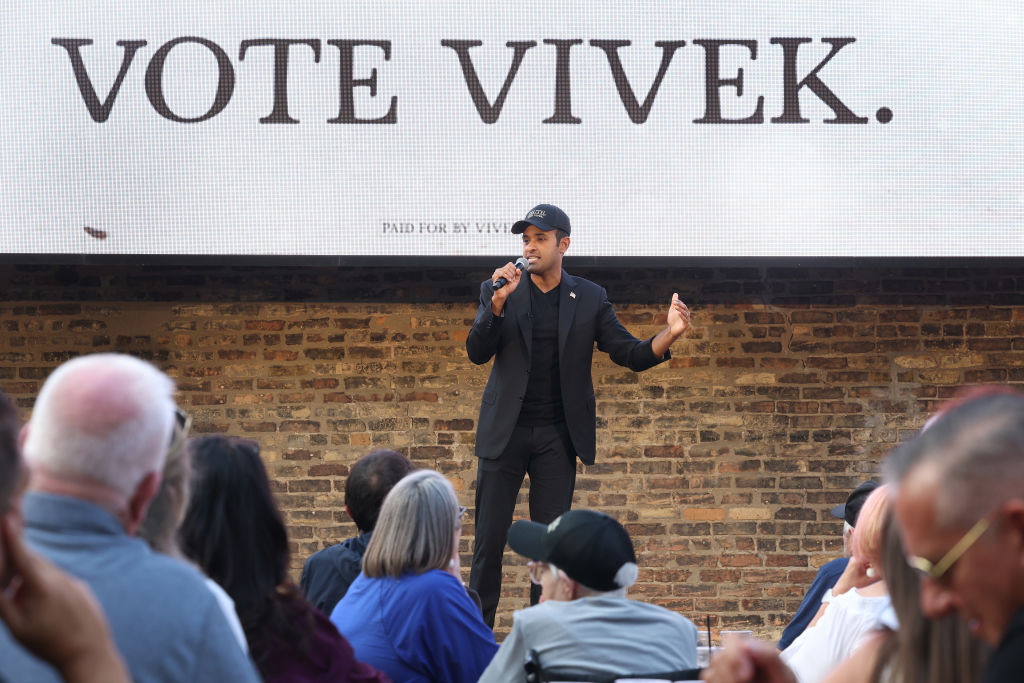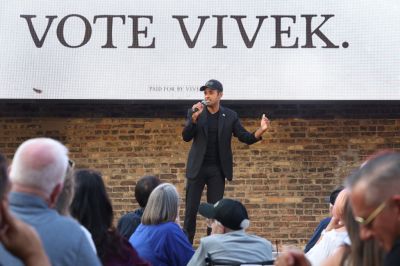DUBLIN, New Hampshire—Vivek Ramaswamy’s post-debate media surge has given him a major confidence boost on the campaign trail, even as he continues to hover in the single digits in most GOP primary polls. The question now is whether his candidacy can withstand the scrutiny that comes with national attention.
Since launching his bid for the Republican presidential nomination back in February, the ex-pharmaceutical executive has crisscrossed the country trying to sell voters on his 10-point presidential manifesto:
“God is real. There are two genders. Human flourishing requires fossil fuels. Reverse racism is racism. An open border is no border. Parents determine the education of their children. The nuclear family is the greatest form of governance known to mankind. Capitalism lifts people up from poverty. There are three branches of the U.S. government, not four. The U.S. constitution is the strongest guarantor of freedoms in history.”
At just 38 years old, Ramaswamy is the youngest candidate in the field, and the biotech entrepreneur—worth hundreds of millions dollars—has embraced his time in the spotlight. He recites those 10 principles with an almost robotic precision at just about every campaign stop, and isn’t shy about sharing his “America First” policy agenda with voters. If elected, for example, he pledges to abolish the FBI, deploy military force against Mexican drug cartels, and cut off U.S. support for the Ukrainian war effort.
But with all the post-debate attention comes heightened scrutiny, and a sustained look at Ramaswamy’s record—from the media and his opponents alike—has unearthed a number of inconsistencies. Is Juneteenth a “celebration of the American dream” or a “useless” holiday? Is climate change “real” or is the “climate-change agenda” a “hoax”? Was Donald Trump’s behavior on January 6, 2021, “downright abhorrent” or is it “unproductive for our country to blame Trump for January 6”?
His self-described “realist” foreign policy views are often similarly muddled.
Take his position on the United States’ relationship with Taiwan, for example. “I’m saying that I will affirmatively defend Taiwan,” he told The Dispatch, “until the U.S. achieves semiconductor independence, at which point—and we’ve been abundantly clear about this, across the totality of everything I’ve said—at which point we should resume our current posture of strategic ambiguity.”
His aside about the “totality of everything” he’s said comes from frustration; he claims journalists are taking him out of context when they say he plans to abandon Taiwan to China come 2028—after his first full term in office, when he’s optimistic the U.S. will achieve “semiconductor independence.” But try squaring Ramaswamy’s post-2028 plan for so-called strategic ambiguity with what he recently told conservative radio host Hugh Hewitt.
“[China has] unfinished nationalistic business dating back to their civil war in 1949. And if that’s the sole basis for Xi Jinping going after Taiwan after we have semiconductor independence, then you know what? I am not going to send our sons and daughters to die over that conflict,” Ramaswamy said, before doubling down. “By [2028], I will have led the United States of America to achieve semiconductor independence, and we will not take the risk of war that risks Americans lives after that for some nationalistic dispute between China and Taiwan.”
Ramaswamy has a super PAC supporting him, but he claims his decision to largely bankroll his own campaign insulates him from donor interests that, in his view, have rendered many of his primary opponents “super PAC puppets.” How can voters trust that he isn’t beholden to what he thinks his small-dollar donors want him to say? “Because I’m my biggest donor,” he told The Dispatch Saturday evening aboard his campaign bus en route to Newport, New Hampshire. “Everyone says what their biggest donor wants them to say. I guess I’m no different.”
A charitable interpretation of Ramaswamy’s apparent about-faces is that he entertains so many voter questions at campaign events that he genuinely forgets where he’s previously come down on a handful of key issues. The more negative interpretation—the one championed by his political adversaries—is that Ramaswamy is so new to politics that his beliefs aren’t grounded in any coherent political philosophy, and he just spits out whatever phrases or stances he thinks the audience he’s speaking to might find compelling. As he admitted to Hewitt during the conversation about foreign policy, “I didn’t know much of this six months ago.”
With Ramaswamy now pushing Florida Gov. Ron DeSantis for his second-place spot in the polls, however, the knives are starting to come out. “This guy is more inconsistent, got more flip-flops—by far—than anybody in the race,” former Virginia Attorney General Ken Cuccinelli—a DeSantis surrogate—told The Dispatch in the post-debate spin room last month.
As noted in Dispatch Politics this week, Ramaswamy seems to think he’s mastered the art of telling Republican voters what they want to hear. But there are still plenty of moments where he seemingly fails to connect.
His family is making “immense sacrifices” on the campaign trail, he told voters at a country store in Hooksett, New Hampshire. While monologuing about his commitment to the American dream, he made sure to dispel any lingering concerns about how his wife Apoorva, a surgeon, balances her hospital shifts with campaign trips, or how many millions of his children’s future inheritance he’s spending on his presidential run. “We’re not asking you to feel sorry for us, we’re really not,” he told a crowd while flanked by his wife and two kids. After all, the most important inheritance his children can receive is the “inheritance of this country.”
Some Republican voters have questions about what they’re hearing. Grabbing the mic early Saturday morning in Amherst, one Christian New Hampshire resident kicked off an awkward Q-and-A session with a focus on the first of Ramaswamy’s 10 Truths. “You say ‘God is real,’ but I also hear some national pride instead of humility before God. I hear putting hope in ourselves and our nation instead of putting hope in God,” said Cindy Hennessey, who hails from Amherst. “Who is this God that you are saying we should follow? And I don’t want you to use, like, Christian catchphrases, just to win us over.”
Ramaswamy thanked Cindy for her question before embarking for several minutes on an answer comparing his Hindu faith to the Judeo-Christian values on which he said the United States was founded. “What you call catchphrases are not catchphrases to me,” he said. “They mean something to me. I was educated in Christian schools. When I read the Bible, perhaps, probably more closely than many of my Christian peers, it didn’t feel like I was reading it for the first time. We share that same value set in common.”
A few in the audience appeared to nod along as Ramaswamy spoke, but others remained unsure about the candidate. To Ed Lowry, a Republican voter from Maine who attended Ramaswamy’s event in Amherst on Saturday morning, the candidate’s stump speech seemed much more performative than the one Mike Pence delivered during a low-key event Lowry’s local Republican group recently held with former vice president. “[That] was not a show production,” Lowry said of the Pence event. “This was a production.”
The biotech entrepreneur clearly enjoys the back-and-forth with voters, and delivers every stump speech with the same spirit and intensity of his high school valedictorian address in 2003. He instructs every attendee he calls on to recite his or her name, and often asks the crowd to applaud for those asking questions—a nurse in Contoocook got that treatment, as did a crying baby in Dublin.
And Ramaswamy isn’t shying away from the scrutiny that comes with the spotlight. No question is out of bounds, he told The Dispatch, because voters have a right to vet him for the job. He and his family have nothing to hide.
But beneath the confident veneer, there were some signs this weekend the mounting criticism was getting to him. “The distortion element of it is a little bit unfortunate,” Ramaswamy said, noting his biggest regret on the trail was being “too trusting” of the media. But that, he said, is simply part of the “job.”
“If I’m not ready to deal with that, I’m not ready to deal with Xi Jinping,” he argued. “And I think I’m actually ready to deal with both.”
But as the Iowa caucuses draw nearer, Ramaswamy is sure to face more questions from the GOP electorate about whether he actually believes in his own campaign platform. “He’s a smart guy, and he’s a very charismatic guy,” says Lowry, the Republican voter from Maine. “My question is: Am I seeing reality or a mirage in him? I don’t know for certain.”
Editor’s Note: A draft of this article was originally published in error. No factual changes were made, but this represents the author’s final version.







Please note that we at The Dispatch hold ourselves, our work, and our commenters to a higher standard than other places on the internet. We welcome comments that foster genuine debate or discussion—including comments critical of us or our work—but responses that include ad hominem attacks on fellow Dispatch members or are intended to stoke fear and anger may be moderated.
With your membership, you only have the ability to comment on The Morning Dispatch articles. Consider upgrading to join the conversation everywhere.